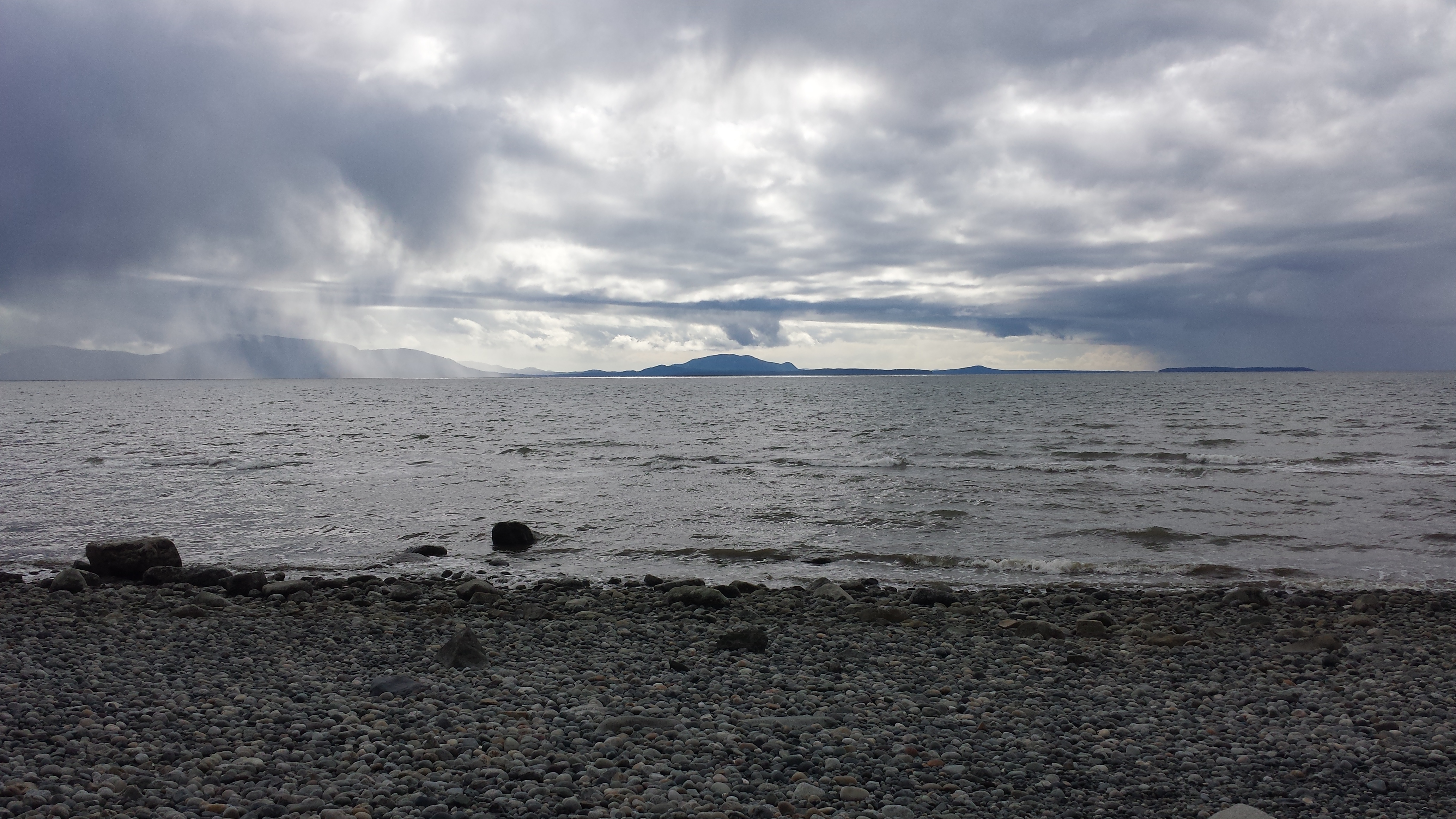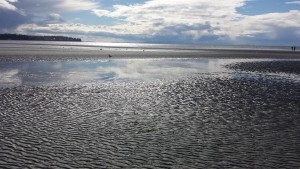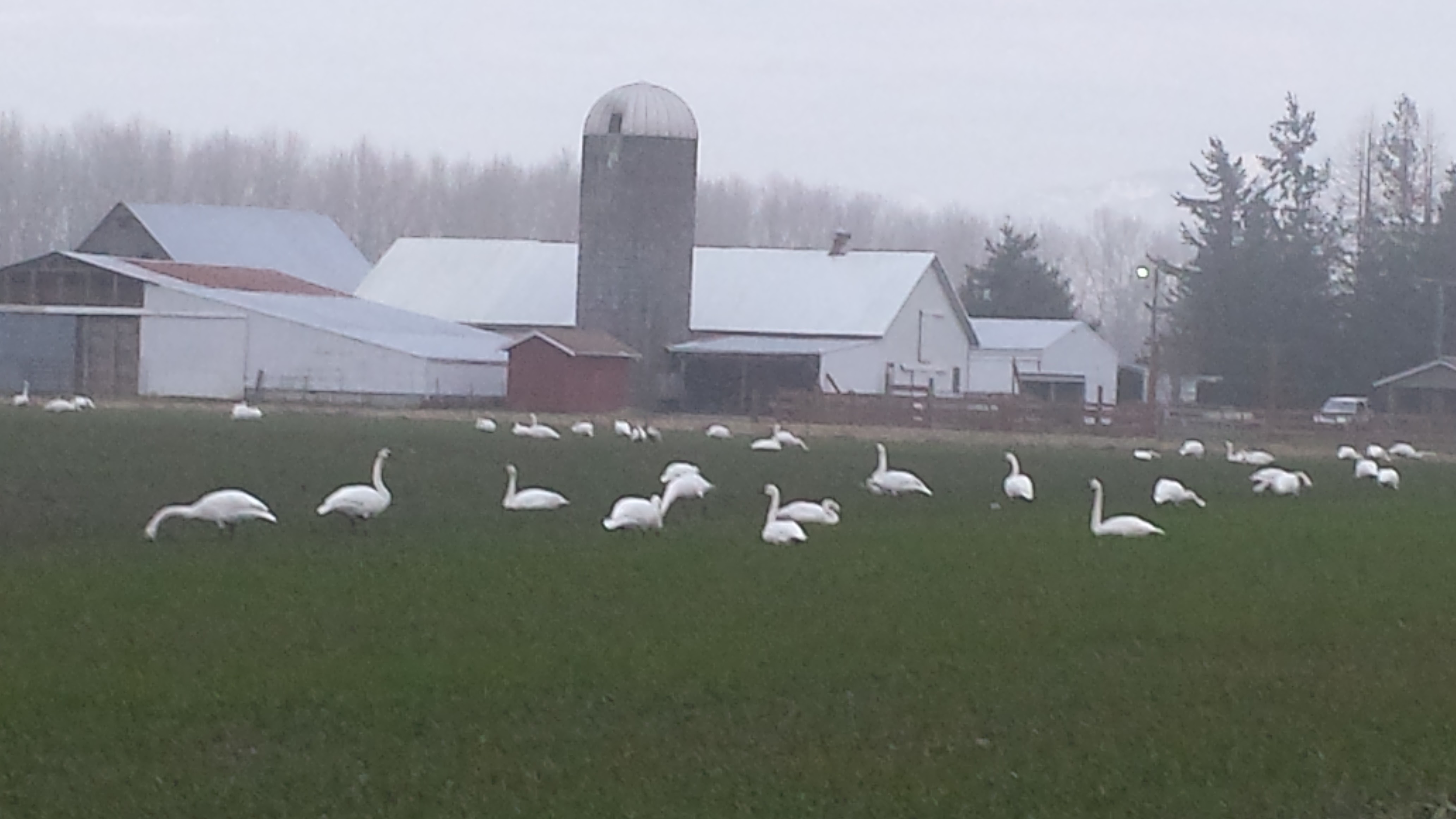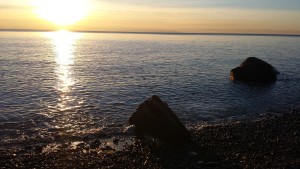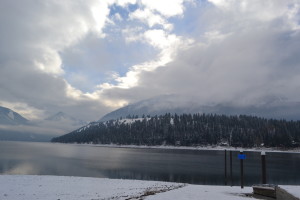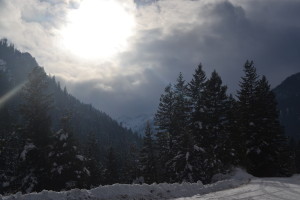
It’s December first.
We’re travelling. While we wait for the opportunity to move to France , we’re traveling to places around the Northwest that have called to us. There is nothing now that holds us back. No demanding job. No crops to prepare or harvest.
We both love road trips, most often on our own. Road trips together are a bit fraught but compromise comes more easily after years of intimacy, years of meditation and years of practice in tolerating the urge to be right. I am trying to actually do what I know, minute by minute, thought by thought. If your truest friend says that he or she is peeved by your behavior, your best response is “My mistake! How unthinking!” not, “I meant to do…” “I really was but you didn’t see” “You’re not being fair!” Convincing the ego is a full time job.
This time we are travelling through the Blue Mountains of Eastern Washington and the Wallawas of North East Oregon. Walter has wanted to explore them more extensively ever since he worked as a fruit tramp in the ‘70s. We’re following urges. Since we typically have had to travel in the winter in order to accommodate the farm seasons, we’ve developed a taste for travel in the cold when most attractions are closed and mostly locals are around.
Today, the snow dusts the mountains. We follow Google Maps navigation rather than relying on our treasured paper maps. I miss Walter’s easy expertise with direction, but this same GPS got us through the villages of Ariege in France this summer, through tiny back alleys and narrow streets with round-abouts. We arrive in Joseph, Oregon, our goal, in the evening, at the time of the year when the sun seems to begin its setting at three pm and it is definitely dark by four-thirty.
We pull into Indian Lodge motel at six. It’s completely dark and the ground is covered with snow. No moon. Debby at reception is covering for the owners who are out of town for a few days. With an easy familiarity, she apologizes for needing to leave after she shows us the room. We spend a cozy evening drinking beer, trying to find something decent on TV, finally watching our old standby “Law and Order” until we fell asleep. We sleep pretty soundly until 6:45 am when the neighbor at the motel, an electrical contractor with a local job, starts up his diesel truck, insisting it had to idle for a half an hour so as not to “be hard on the engine.” Baloney! His father, having grown up in the ’50s, must have drilled this into his head. Even so, he drives off after about fifteen minutes and we go back to sleep.
The morning of our first day we try to hike up Hurricane Creek to see the incredible mountain views and get some brisk exercise. The car won’t make it up the snowy road to the trailhead though, so Walter maneuvers it back down the road a way and gets it out of the six inches of snow where it was determined to get stuck. Clearly, this car had not been with me in my back-to-the-land days in Vermont. We walk up the road for a couple of miles, enjoying the tracks in the snow, the white cascades flying down from the tree branches and the views of the white craggy mountain tops against luminous fog and clouds.
We drive back down to Joseph, go take a long look at Lake Wallow with its drifting clouds and patches of blue sky reflected in the cold water and then drive south towards Hell’s Canyon. We can’t make it far in that direction because of the ice and snow on the roads. We decide to instead to head down toward the isolated town of Imnaha, through beautiful dry gentle washboard hills, brown, buff and green blending with the red and rust of the mostly bare willows and native dogwood, with a wide stream meandering slowly at their feet. Here it’s much warmer than higher up at Joseph.
We stop off for lunch and a beer in the late afternoon at the tavern and store at Imnaha. It’s been there for over a hundred years. Now there are twenty-two people living in the town but folks are scattered around the valley and down the main road. The bartender is a trim woman with short blondish hair and a weathered face that she keeps pretty straight until she smiles at something a regular tells her. She’s relaxed and warmly friendly, moving constantly around the bar and into the back. Ken, her dad, comes in soon after we sat down at the bar where the collection of signs has been occupying my attention. I imagine that Ken is pretty prosperous, if not from farming of some kind then some kind of clever pandering. He’s open, wears an obvious charm with ease and is probably pretty smart.
I ask him whether he’s lived there forever.
“Forever is a long time, but I guess I have.”
Accommodatingly, I rephrase my question. “Were you born here?”
“Yes”, he replies. He was born in Joseph down the road but moved down the valley long ago.
“Forever is a lot of years for me. I’m older than I look. You can tell my age when I take my hat off,” an act he obligingly performs, smiling, to reveal his bald scalp with tufts of white hair like tumbleweed on the hillside.
I tell him that we all have our own forever and mine seems to go back a ways now, too. He talks with his daughter a bit about the project with a motor he’s done today with apologies for failing to stop by earlier when he’d said he would. A buddy walks in and they chat about the hunters at the motel who had pulled in four elk today.
I ask the bartender whether there’s a motel in Imnahof and she replies,
“Yes, the Motel 3.”
“Half a Motel 6?” I ask.
“Well, yeah, three rooms with bare light bulbs you better not leave on all day!”
Walter turns his stool towards mine to reminisce about the show “Laramie” for a moment. Its actually on the TV that hangs at the back of the store.
“The thing about those ‘50s shows was everyone was so clean!” he says.
I have to agree.
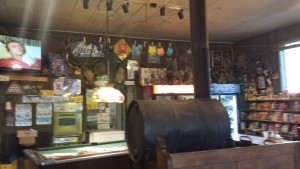
As the conversation shifts at the bar, Walter looks at me and silently points to folded money seemingly pinned all over the ceiling. I nod in recognition, assuming he knows all about this phenomenon and will fill me in later. Maybe it’s a feat of shooting prowess. Walter surely has encountered this before somewhere in his travels in the west. Soon an older couple walks in and sits at one of the wooden booths in the middle of the room. She opens the ad section from the paper and says,
“Boy! If you buy 8 bags of chips you can get a pound of sugar free. Hadn’t seen that before.”
The wood in the metal barrel heaters in the back crackles a bit. It’s toasty warm in here. The bartender comments to her dad that the hunters should be showing up any minute.
“Yeah. Covered in blood” remarks the man at the table.
“Naw, some people shower. Even hunters” she replies.
As another friend, Fred, walks in, the woman at the table says,
“Sockeye salmon is 5.99 a pound.” My ears prick up at this.
“Where?” I ask.
“Oh, down at the Safeway.”
“It’s a damn good price” I reply.
“Yup.”
I encourage Fred to sit on the stool open next to me at the bar where he can talk to his friends at the table and Ken and the bartender at the same time. He consents and picks up his beer, his grey hair poking out the bottom of his old red ball cap. Ken is talking about the weather and tells me that it’s usually 10 degrees warmer in this valley than up in Joseph, 1000 feet higher up.
“Do you guys find lots of evidence of ancient encampments all around here?” I ask, always the anthropologist.
“Yup, tons.”
“Yeah, thought they would spend the winter here where it’s warmer and there’s lots of game.”
“Yeah. That’s sure true.”
Fred’s turned toward me to join in the conversation and I ask him if he were born in Imnaha.
“No. In Portland.”
“When did you move here?”
“A week later”.
Turns out that his grandfather had a ranch up at Imnaha. Hard to tell whether his parents already lived there with them back in the late ’30s and went to Portland just to make sure he was born safely or whether Portland was where his parents met, conceived him and birthed him. At any rate, as soon as mom was able they took a car, a truck, a wagon, a sled and another truck ride, the get to the ranch at Imnaha. He’s been there ever since, although at some point he traveled as far north as Bellingham, Washington, close to where we live. It was some long while back though.
Ken meanwhile is talking to his daughter about recipes for sugar cookies. Looking at a recipe file he’s pulled from somewhere in the back of the store he says,
“Fifty-three cups of flour, 43 cups of sugar and 42 eggs. Does that sound right?”
“Woah! You feeding the whole valley?” I ask.
“Well,” he smiles, “I come from a family of twelve kids. This is my mom’s recipe.”
His daughter says that he’d better multiply the recipe by eight and starts the calculations. When I ask, she mentions that she starts making the cookies about now and keeps her three ovens going at the store to get enough ready for Christmas.
“I can’t start them when people are in the bar ‘cause then they smell ‘em and they go real quick.”
“Do you ever burn any when you get busy?” I ask.
“Aw, yeah. A tray or so a year. I serve them at the bar. They go well with beer.”
I’ve been noticing a couple of signs, among the many, like “My husband is taking iron pills. When he’s ready, I’m rusty.” “Even a toilet can only serve one asshole at a time.” “It’s hard to kiss the lips of someone who’s chewed my ass all day.” “Buy me another beer. You’re still ugly.”
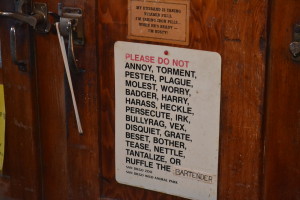
It’s another that really gets my attention. It’s a picture of a wolf with a line across his face and the statement “No to Canadian Wolves” and another that said, “Canadian Wolf meat. $30/lb.”
Looking away, I asked, “What kind of wildlife do you have around here? We saw a flock of wild turkeys on the road. I’ve never seen that anywhere else.”
“We have a lot of bear, elk, deer, coyotes…”
“How about grizzlies?” I ask.
“Nope. Lots of black bear.” she says but someone else says,
“Yeah. Occasionally. Used to have more.”
“Foxes?” I ask.
“Naw. Wolves, coyotes. Foxes over in the valley one south.”I don’t ask about the Canadian wolves. She’d scowled when she’d mentioned wolves.
We talk more about the holidays coming up and Fred mentions the eleven people that had been shot by three people in body armor in San Bernardino earlier that day. We think together, trying to remember how many mass shootings we have had in the US in the last few weeks. Neither could recall exactly. Horrifying.
Fred says, “I thought of not coming down here this afternoon since it’s the place with the most people together all around here.”
I joke that in a town of twenty-two inhabitants that couldn’t be that much of a target. He replies,
“You wouldn’t believe how packed this place gets most nights. It’s completely full up. People like it better here than the places in Enterprise even. They come here from there and Joseph. Packed.”
We take our leave warmly, forgetting to ask about the bills on the ceiling. We may have to go back.
It’s Thursday morning. There was a big hole in my night that threatened to be consumed by fears. Burning trails of thought that blaze through the night like slow shooting stars: “I have to have some way to bring in money.” “It’s not right for me not to work. I’m still young and full of energy.” “You’re full of it”, I told myself. “All this will have faded like the stars by daylight.” There’s some comfort in these admonitions. I brought my mind to the vast, silent inner space, the universe. It stayed there, interrupted by thoughts of an itching here, a crick there until I somehow drifted back into the realm of dreams. I was awakened abruptly by a noise outside. It’s already 8 am. I sleep so much later now.
It’s our last day in the Wallawas. This morning I learned how to pronounce Imnaha with an emphasis on the second syllable. The waitress at the Cheyenne Café gracefully corrected me as I was helping Walter finish the huge mound of pre-cut hash browns on his plate. We walked down the street towards our motel and stopped in at a tourist store with a winter sale. Turned out to have beautiful Native American jewelry. Walter spontaneously bought me a silver bracelet with a turquoise butterfly. What beauty in such a gesture.
Later in the afternoon we take a walk up a road called Rail Canyon. At its foot there’s a place with a wrapped yurt, a fine looking shop building and a small wind turbine and solar panels. We examine the energy production set up and walk up the slushie hill, finding places with snow or dirt to keep our footing and curious about the foot prints of deer, elk and squirrels in various patterns on the way up.
Up the hill, we find a new large home with wind and solar power, much grander than the one at the bottom, obviously affluent. Sauna building with adjoining hot tub.
When we come to the end of our walk at the bottom of the hill again, we find the owner of the yurt receiving an Amazon package from a guy in a jeep. The man with the yurt has long greyish hair and, as he accepts the package, is occupied with this vision of two older folks walking down his hill. Turning to the delivery man he says,
“I’m seeing people who may have a vehicle problem up the hill. They might need some help.”
We say hello and reassure him that we’re just out for a walk and have the car parked on the main road at the bottom. We strike up a chat. He says yes the yurt is his and it’s his bedroom. The shop is the rest of his home while he builds a house on the land up the creek a bit. He’s amiable, with sharp eyes. He tells us that he is able to get enough power from his wind and solar to give him electricity over-night most nights but the wind power is inconsistent since he’s not in the current of air coming through the valley. His protected site has its advantages but wind power isn’t one.
“If I’d realized how inconsistent the wind is, I wouldn’t have invested in the turbine. The solar panels work well enough most of the time, but in the cold dark times I’ve had to use the generator once or twice for twenty minutes or so to get things primed so we don’t freeze. I have to rely on alternative energy since we’re two miles from the grid”.
I comment that he still is able to get Amazon delivery.
“Yup. It’s the only way I can get most of my equipment. Much cheaper anyway.”
We tell him it’s pretty much the same for us. Turns out he lived in Olympia for thirty years. As we walk to the car, we wonder if he were a lawyer or a government cog. Interesting.
We decide to drive back up to Imnaha for a beer and a bite at the Tavern and Store, mostly so we can find out how those dollar bills get up on the ceiling. Also because we liked the place and want an excuse to go back and have a beer. It’s more interesting than anything in Joseph at the moment.
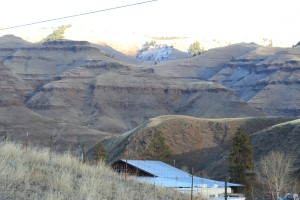
As we drive up the road, passing again the undulating hills in a new, greyer light, we share an unspoken awareness that nothing good is ever as good the second time around. We say nothing, curious at any rate to see what experience turns up this time.
When we arrive at the store after driving around several large rocks in the road, there’s more of a crowd. It’s a bit later in the day, there’s no room at the bar and a young woman is taking orders. A couple of the men recognize us immediately from yesterday’s visit and say,
“Well you couldn’t stay away, heh?”
We sit at a booth in the middle.
“Naw. You’re right,” we answer. “Had to come back to find out how those bills get up on the ceiling.”
Ah! We’ve asked the right question. Everyone is happy to tell us, but the guy who turns out to be the owner starts it off.
“It’s to help fund a party we have every year. You wrap a bill in a quarter with a tack through it and lambast it up to the ceiling. If it sticks, you’re entered in a prize drawing.”
The woman at the bar shows Walter how to make the missile, with the help of a couple of onlookers. There’s a brief dispute about whether it’s one quarter or two, but it’s resolved when two won’t fit in the package.
Walter takes the finished product and throws it hard underhand at the ceiling. It bounces off.
“You’ve’ really got to whack it up there hard as hard!” someone shouts.
He tries again and it bounces. He hands it to me to take a try — me who had remedial throwing at summer camp when I was eleven. I throw it at an angle and miss the ceiling entirely. He gives it another good whack and there, it sticks!! We’ve passed.
We get our beers and order the least greasy, awful thing on the menu of fried chicken hearts, fried gizzards, special hamburger, fried hot dog and French fries. It’s the fries. We’re hungry.
Ken walks in with his wife and immediately says “Hi” to me and then recognizes Walter. He introduces his wife, Pat, and we invite them to sit with us in the booth. Pat lets Walter help her off with her fur coat and sits next to me and takes off her hat, smoothing her dyed blond waves, cut close around her head.
She turns to me and we begin the normal preliminary chatter. It soon becomes clear that she is in some early-ish stage of dementia, turning to Ken from time to time to fill in gaps of memory about the day or the names of family members. She is also charming, and clearly annoying to her husband.
We gradually find out more about their history. He is of German stock, she English. He was raised in Joseph with eight siblings, she in Imnaha with one sister. She tells me she has been to see her sister in a “home” yesterday and they had a good chat. She was tickled that her sister reminded her she had been “orn’ry” as a kid and had given her older sister a hard time. Her face brightens.
“We used to ride our horses over here, tie ‘em up and come in and watch the men play checkers and talk around the fire.”
We tell them about our walk up Rail Canyon Road and ask whether they know the fellow with the yurt at the bottom.
“Oh yeah,” says Ken. I know him pretty well. He’s a real nice guy. Owes me some for a couple of rides I’ve given him down to Enterprise in the winter to get stuff. Yeah, interesting guy.”
He’s leaving something out.
We ask what the guy did before he came here, curious if we could validate our hypotheses. Ken shrugs and turns his head as if interested in something at the bar. Doesn’t want to tell us.
The thought of Rail Road spurs Pat to question where it is. She confuses it with a road where they got stuck one year, taking her nephew to cut a Christmas tree. She starts and stops the story several times. Ken is clearly exasperated by her attempts and doesn’t want to be reminded of the embarrassment, but we prompt her and she finishes. Ken ads some details about how he managed to get out of the mud.
We talk more about ancestry and then baking, since we know Ken will be making cookies. Pat evidently doesn’t help much with this. Since we’ve been at the store awhile, it seems time to go and we begin wrapping things up.
Ken, who’s gotten up to talk to a friend suddenly comes up next to me, puts his arm close around the back of the booth next to my shoulder, puts his head down next to mine with his other arm on the table, enclosing me. I’m a bit alarmed but let him stage whisper a recipe for twice baked potatoes, while he clearly enjoys the dominance he’s asserting.
He pulls himself up when he’s recited the whole recipe and I’ve said “Gee I’ll have to try that!”
Walter and I and Pat all get up. Walter reaches over to help Pat with her coat. While she is thanking him, I mention that “Yes, Walter is a real gentleman”
“My husband’s got nice manners in a lot of ways but he’s not a gentleman like that!” she twinkles.
On the way out, I stop to say goodbye to the man Ken pointed out as the owner. I tell him I’ve heard that he gets quite a crowd up here from Enterprise and Joseph and beyond.
He says “Yes, they do sometimes, but business is slower. I’ve owned the place for thirty-five years and now I’m looking to sell.”
He tells the story of how he had come up to see the area and hunt and saw the tavern that used to be next door for sale. He was interested, but left without asking the price. He called a few days later, since he couldn’t get his mind off the idea of starting a business up here. That place was too expensive for him, but it turned out this store was also for sale at a price he could afford. He snapped it up. He married his wife soon after and they’ve made a real go of the place for years.
“Every summer, we’ve had a rattlesnake and bear feed. People come from all around just for this darn event. One woman from Norway happened to be around here for vacation years ago and someone told her to come. She was crazy about it. She came back every year for seventeen years. Flew people in with her from Norway to the little airport in Joseph. She hasn’t been back for a couple of years. Don’t know what’s happened to her.”
“Rattlesnake and bear meat?” I say. “You must need a whole heck of a lot! Where do you get it all?”
“People bring in their snakes when they catch ‘em and donate bear meat when they have more than they can handle. They’ll donate their extra tags and friends will go out and hunt ‘em. We keep it in the freezer. I only take it fresh though. Some of those hunters have to put the bear on the car and go show it off in town. By the time they’d get it to me, not so good anymore. I won’t take those. We get plenty, but it’s gotten smaller in the last few years. Guess not as many people can afford to make the trip.”
We say our goodbyes all around, urged by all to come back again in the summer. As we drive away in the dark late afternoon, dark hills and mountains surrounding us, Walter asks if he should have intervened with Ken.
I say “Naw. If I’d felt threatened, I would have done something about it myself. Just an old guy enjoying himself.”
“Dominance behavior, pure and simple” says Walter.
I have to agree.
The disappointment of a second visit, but still damn good stories.

